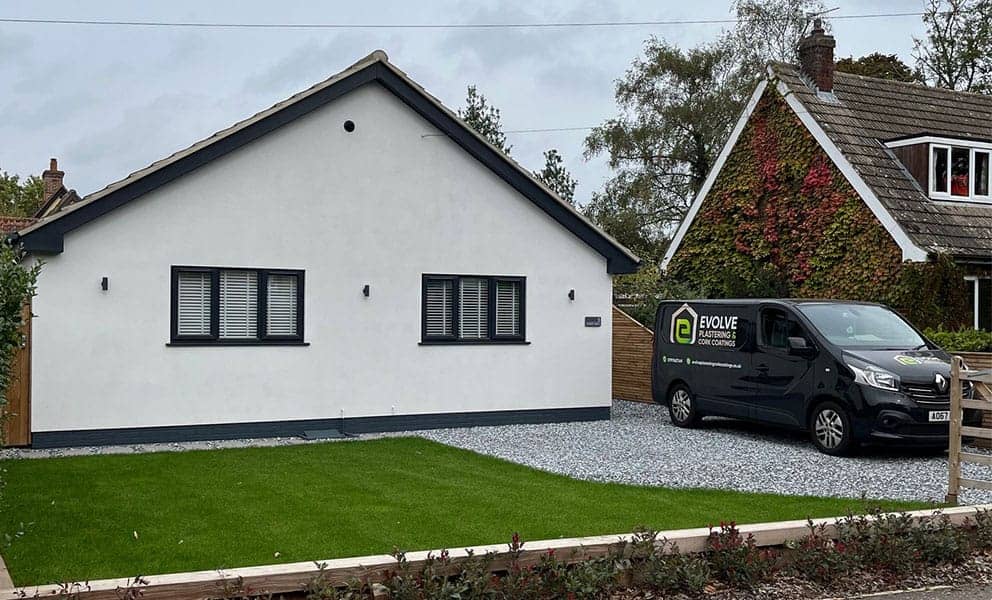
Photo credit: Evolve Plastering & Cork Coatings
If you go ahead with changing your render, one of the first things you’ll want to know is how long-lasting it will be. It’s a valid question. With strong weather, the threat of cracking and other risks to the exterior – it’s essential to know how durable the render is before you choose the type you want.
Read on as we look at the factors affecting how long render should last then discuss how long the different types of render will last on your walls.
With the good old British weather, your render can be relied on to take a battering. Year after year, wet and windy weather, along with cold temperatures, can threaten your rendering and leave it needing attention.
Alongside winter weather, fluctuating temperatures can cause materials to expand and contract, which can lead to hairline cracks developing. These small cracks can fast develop into large cracks, especially when rain gets in and enlarges the crack as it freezes.
Don’t think your render gets a break in the summer either. Hot temperatures can cause your render to fade in colour, drying it out and leading to flaking.
Any properties close to the coast can be affected by a further risk. The salt from the sea spray can stain and corrode exterior walls over time. Add in high winds and there is a likelihood that the salt can strip paint and cement-based coatings. You can remove any salt stains with an acid wash but are likely to consistently encounter the same problem.
There isn’t just a corrosion risk on your wall’s exterior. Efflorescence can occur – the process of water reacting with salt in building materials – causing damage internally.
Older buildings are likely to need more upkeep as they won’t have the benefits of new building materials. Things like fibre cement siding and aluminum cladding boards can help render last longer as they are low-maintenance and absorb less moisture than other materials.
The level of workmanship used when applying render is important to note. If the wall wasn’t prepared and cleaned beforehand, it won’t last as long. Cracks, breaks and the risk of the exterior peeling off will shorten the expected lifespan.
The quality of the render chosen for your home is extremely important, but you also need to choose a reputable professional to apply it. Make sure you do your research on local tradespeople in your area and pay attention to word-of-mouth recommendations.
Obviously, some renders have longer life spans than others, but you should keep in mind that it needs to be maintained in line with manufacturer guidelines. This will ensure that the life span is increased and you are keeping your warranty valid. For example, getting hairline cracks filled in will prevent them growing over time.
It depends on what it’s made from. Some last longer than others, so knowing the difference between the types will let you know if your render is the long-lasting type. You could also find out if your render is nearing the end of its life, by checking for rebound. Simply give it a hard knock with your knuckle and see how easily it bounces back. If there is no rebound, then your render will need re-application.
Widely thought of as durable and strong, cement render is made from mixing sand, cement and water. This may be seen as a good thing as it can battle against the elements easily. But being strong also means inflexibility and it’s important that render has the space to breathe or cracking will occur. Because of this, cement render typically needs replacing after 7-15 years, depending on underlying conditions.
How long does lime render last? Many prefer it to cement, as it is particularly reliable and known to last anywhere from 20-30 years. It is a breathable option and more eco-friendly than other types of render. Made from sand, lime and water, it has great flexibility which decreases the risk of cracking.
Similar in longevity to lime render, wet plaster render should last anywhere from 20-30 years. Giving a smooth finish, wet plaster render offers breathability. But there is a danger of hairline cracks developing before it has time to dry.
Lightweight and water-repellent, silicone render offers low maintenance and durability and is resistant to cracks. Its rubbery properties give it extra protection from high temperatures. Combined with an adhesive base coat, the average lifespan of a silicone coating is between 25-30 years.
One of the main issues with the renders outlined above is that – even though they ‘last’ for a certain amount of time – cracks can still develop in your render. This is due to weathering, changing temperatures and the natural movement of buildings. Once render is cracked, it no longer looks the part or performs as required.
To keep your render looking good and working at its best, CorkSol’s innovative SprayCork is naturally flexible and crack-resistant. The durable, robust render is made from eco-friendly cork particles, which also gives it impressive insulation qualities and salt-resistance.
How long does the render last? With a 25-year guarantee, you can expect it to keep your walls protected and looking great long into the future.
Need to replace your old, cracked render? Or want to add render to your property’s walls? SprayCork is a long-lasting and high-performing exterior wall coating for both domestic and commercial properties.
It’s available exclusively through our network of approved applicators, so you can rest assured it will be applied to the highest standard. Want to find out more? Contact our team on 01484 442420, email [email protected] or find an approved applicator online.
"*" indicates required fields